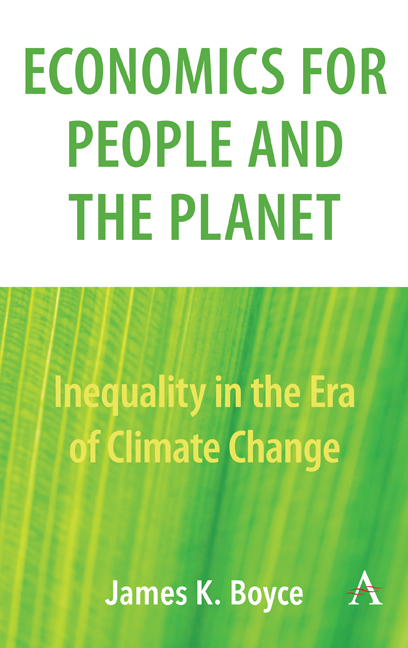Book contents
- Frontmatter
- Contents
- List of Illustrations
- Acknowledgements
- Part I Rethinking Economics and the Environment
- Chapter 1 Limits to Growth–of What?
- Chapter 2 The Twin Tragedies of Open Access
- Chapter 3 Pursuing Profits–or Power?
- Chapter 4 Rent in a Warming World
- Chapter 5 Universal Assets for Universal Income
- Chapter 6 Universal Basic Income: Six Questions
- Chapter 7 Environmentalism's Original Sin
- Chapter 8 Rethinking Extinction
- Part II Environmental Injustice
- Part III Climate Policy
- Notes
- Publication History
- Index
Chapter 5 - Universal Assets for Universal Income
from Part I - Rethinking Economics and the Environment
Published online by Cambridge University Press: 12 February 2019
- Frontmatter
- Contents
- List of Illustrations
- Acknowledgements
- Part I Rethinking Economics and the Environment
- Chapter 1 Limits to Growth–of What?
- Chapter 2 The Twin Tragedies of Open Access
- Chapter 3 Pursuing Profits–or Power?
- Chapter 4 Rent in a Warming World
- Chapter 5 Universal Assets for Universal Income
- Chapter 6 Universal Basic Income: Six Questions
- Chapter 7 Environmentalism's Original Sin
- Chapter 8 Rethinking Extinction
- Part II Environmental Injustice
- Part III Climate Policy
- Notes
- Publication History
- Index
Summary
Universal basic income can come from universal basic assets–our common wealth.
Lately there has been renewed discussion of universal income: regular cash payments to everyone regardless of race, gender or need. In the United States, variants on this idea were earlier proposed by people as ideologically diverse as the revolutionary Tom Paine, civil rights leader Martin Luther King Jr., freemarket economist Milton Friedman and President Richard Nixon. Renewed interest has been sparked today by the income stagnation experienced by America's middle class and working poor, and by the persistent slow growth experienced by the economy.
The idea finds support across America's ideological spectrum, in an era when hardly anything else does. Liberals, or at least some of them, like it as a way to preserve the middle class when jobs no longer pay enough. Conservatives, or at least some of them, like it as a way to reduce dependence on our byzantine maze of welfare programmes.
But universal income would be expensive, and it quickly runs into the stumbling block of how to pay for it. Its widespread appeal is held in check by equally widespread aversion to taxes, especially taxation for the purpose of redistributing income. Fortunately, there's another way to pay for it: universal income can come from universal assets, a.k.a. our common wealth.
The common wealth that we inherit together and create together is worth trillions of dollars, yet at present we derive little, if any, income from it. Our joint inheritance includes gifts of nature such as the atmosphere, underground minerals and fresh water, as well as socially created assets like our legal and financial infrastructure, without which private corporations couldn't exist much less thrive. If these were better managed, our common assets could pay a universal monthly dividend to every American, children included.
Consider, for example, the limited capacity of the Earth's atmosphere to absorb safely the pollutants that cause climate change. By charging polluters for use of this scarce asset, we can both protect our climate and generate dividends for all. Other forms of pollution can and should be priced, too. And we could charge market prices for extracting minerals and timber from public lands, resources now leased to private firms cheaply in sweetheart deals. Making polluters and extractors pay for their use of natural assets, without abandoning smart regulations, would provide market-based incentives for their wise use.
- Type
- Chapter
- Information
- Economics for People and the PlanetInequality in the Era of Climate Change, pp. 17 - 20Publisher: Anthem PressPrint publication year: 2019



